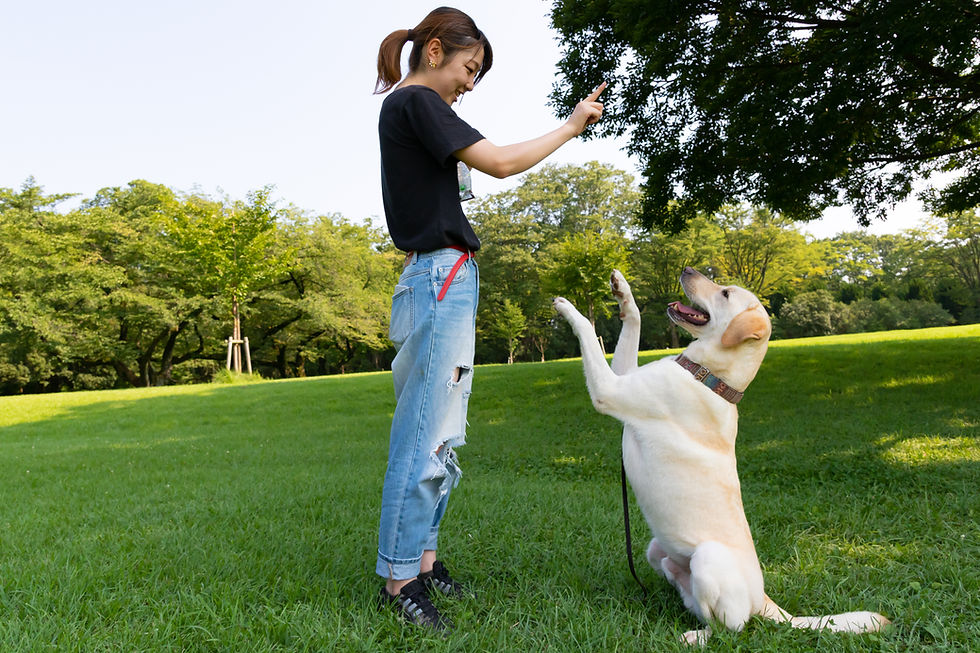What's the difference between a dog trainer and a behaviorist?
- Subhodip Unitel
- Sep 12, 2024
- 3 min read
When it comes to improving your dog’s behaviour or training them for specific tasks, you might encounter terms like “dog trainer” and “dog behaviourist.” Understanding the distinction between these two professionals can help you choose the right approach for your dog’s needs. This guide will explore the differences between a dog trainer and a dog behaviourist, and how each can be beneficial for dog training in North London.

What Is a Dog Trainer?
A dog trainer focuses on teaching dogs specific commands and behaviours. Their primary goal is to help dogs learn obedience and skills that will make them well-mannered companions. Here’s a closer look at what dog trainers do:
Basic Commands and Skills: Dog trainers work on teaching fundamental commands such as sit, stay, and come. They also train dogs in more complex tasks like agility or service work.
Training Methods: Trainers often use techniques based on positive reinforcement, where dogs receive rewards for performing the desired behaviour. This method encourages dogs to repeat the behaviour to receive more rewards.
Puppy Training: Many trainers specialise in puppy training, helping young dogs learn basic commands and socialisation skills. Early training is crucial for developing good habits and a well-adjusted adult dog.
What Is a Dog Behaviourist?
A dog behaviourist, also known as a dog behaviour consultant, deals with more complex behavioural issues. Their focus is on understanding and modifying problematic behaviours. Here’s what sets behaviourists apart:
Behavioural Issues: Behaviourists address problems such as aggression, anxiety, and phobias. They work with dogs displaying severe or persistent behavioural issues that cannot be resolved through basic training alone.
Behavioural Analysis: Behaviourists conduct thorough assessments to understand the underlying causes of a dog’s behaviour. This might involve evaluating the dog’s environment, history, and interactions with people and other animals.
Therapeutic Approaches: They use various techniques to modify behaviour, including desensitisation, counter-conditioning, and behaviour modification plans. Their methods are tailored to address specific issues and improve the dog’s overall behaviour and well-being.
When to Choose a Dog Trainer vs. a Dog Behaviourist
Choosing between a dog trainer and a dog behaviourist depends on your dog’s needs:
For Basic Training: If you need to teach your dog basic obedience or commands, a dog trainer is typically the right choice. They can help your dog learn good manners and essential skills.
For Behavioural Problems: If your dog exhibits significant behavioural issues such as aggression or severe anxiety, a dog behaviourist is more suited to handle these complex problems. Their expertise in behaviour modification can address the root causes of the issues.
Combining Services for Best Results
In some cases, combining services from both a dog trainer and a dog behaviourist can be beneficial. For instance, a trainer might work on obedience while a behaviourist addresses underlying behavioural issues. This combined approach ensures that all aspects of your dog’s behaviour are addressed comprehensively.
Finding the Right Professional
If you’re seeking dog training in North London, consider the specific needs of your dog when choosing between a trainer and a behaviourist. Look for professionals with experience and qualifications relevant to your dog’s needs. Whether you need basic training or more advanced dog rehabilitation, choosing the right expert can make a significant difference in your dog’s behaviour and overall quality of life.
Conclusion
Understanding the differences between a dog trainer and a dog behaviourist is crucial for addressing your dog’s needs effectively. While dog trainers focus on teaching commands and skills, behaviourists specialise in modifying problematic behaviours. For dog training in North London, consider Doggle, where you’ll find experienced professionals ready to help with both training and behaviour challenges. Whether your dog needs basic obedience or more in-depth behavioural support, Doggle offers comprehensive services to ensure your dog’s success and happiness.



Comments